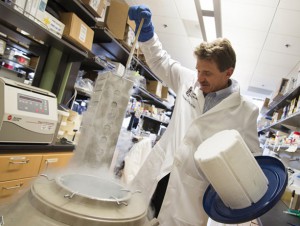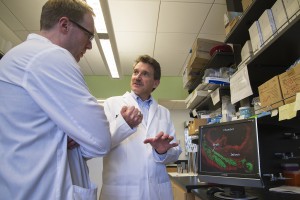Heart Disease Research at Primate Center Started with $75,000 Ignition Pilot Program Award

SEATTLE – Promising new heart disease treatment being researched at the Washington National Primate Research Center receives $10 million funding infusion from Washington Research Foundation to bring total funding to $25 million. The stem cell-derived therapy could change heart disease treatment following a heart attack and impact a leading cause of death globally. Suitability of stem-cell derived therapy being tested in nonhuman primates to assess scalability, feasibility, safety and efficacy prior to human clinical trials slated for 2019.
Pluripotent stem cells provide a potential solution to current epidemic rates of heart failure by providing human cardiomyocytes (heart muscle cells) to support heart regeneration. Studies of human embryonic-stem-cell-derived cardiomyocytes in small-animal models have shown favorable effects of this treatment.
Research conducted by Drs. Charles Murry, Michael LaFlamme and a team of researchers from the Institute for Stem Cell and Regenerative Medicine resulted in the 2014 article in the journal, Nature, supporting this therapy’s scalability and viability of remuscularization in an infarcted nonhuman primate heart.
“We have demonstrated that human embryonic stem cells can be used to ‘remuscularize’ the heart of macaque monkeys after acute myocardial infarction,” says Dr. Charles Murry, Director of the UW Institute for Stem Cell and Regenerative Medicine. “In small animals, this therapy results in significant enhancement of cardiac function. Nonhuman primates will be a main model for preclinical efficacy testing before our first human patients in 2019.”
Ignition Pilot Program Boost

Initial funding for this work came from the Ignition Award Pilot study program offered jointly by the Washington National Primate Research Center and the UW Institute for Translational Health Sciences. The purpose of the Pilot award is to explore innovative areas of nonhuman primate research and generate preliminary data to serve as a basis for submission of new research grant applications. Applications for the pilot program are currently being accepted with a deadline of February 19, 2016.
“The pilot program allowed us use a nonhuman primate model forour research,” says Dr. Charles Murry, Director of the UW Institute for Stem Cell and Regenerative Medicine. “We used data collected via the $75,000 pilot award to raise $25 million from UW Medicine and philanthropy such at this from the Washington Research Foundation.”
The WaNPRC performs critical biomedical research leading to new advances in science and medicine. WaNPRC researchers are working to develop effective vaccines and therapies for HIV/AIDS and other infectious diseases as well as new advances in genetics, neuroscience, vision, and stem cell biology and therapy. The WaNPRC directly supports the National Institutes of Health’s mission to translate scientific advances into meaningful improvement in healthcare and medicine. Learn more at www.wanprc.org.